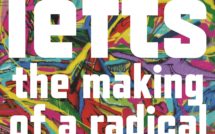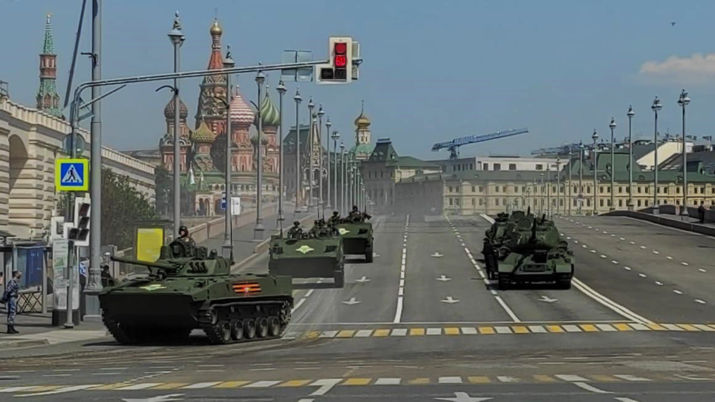

This is part of a series on the Ukraine Crisis.
The Banality of World War “Z”
As Russia’s aggression endures in Ukraine and the West has punished Russia with economic sanctions and “cancel culture,” the largest country in the world has irreversibly changed. The war symbol Z, which first emerged on Russia’s tanks engaged in Ukraine, has been strategically used in patriotic slogans meant to unite the nation in its alleged fight against Nazism and genocide. Indeed, today, as a result of propaganda, some popular slogans in Russia suggest:
Z: #Своих не бросаем! — Z: We don’t abandon/betray our own
Zа Россию! — For Russia!
Zа Мир без Нацизма — For the world without Nazism!
This propaganda is rooted in the history of Russia as the country transitioned from the Russian Empire to the USSR and went through WWII (known and fought in the former Soviet Union as the Great Patriotic war of 1941-1945) and the Cold War. In the mind of many Russians, the two world wars have never truly ended, and these wars have crafted Russians’ worldviews and master narrative. In fact, Russia has never fully accepted its losses, whether ideological or territorial. The weaponization of Russian cultural memory, which includes the cult of the Russian tsars and of the Chief of Proletariat, Vladimir Lenin, as well as the sacralization and commemoration of the Great Patriotic War, are among the factors that have greatly contributed to the ongoing, brutal war in Ukraine. This essay illuminates how—in the words of Nietzsche—“the use and abuse of history”[1] (and of cultural memory) in Putin’s Russia has naturally led to what Hannah Arendt so brilliantly coined as The Banality of Evil.[2] We explicate how the seemingly unprecedented war in Ukraine is, in fact, a way for Russia to dangerously reiterate its own past. Indeed, a known script has re-emerged, but with a renewed cast. In other words, by means of substituting the old Nazi/Western enemy with the rhetorically created Ukrainian enemy framed as the new Nazi, the Russian propaganda machine has succeeded in colonizing and militarizing the Russian national mindset.
The weaponization of memory: from the Tsar to Lenin
Although, ideologically, Russia has transformed from a monarchy—via the Soviet dictatorship—to a post-Soviet autocracy, its deeply ingrained cultural traits have never changed and have included feelings of cultural superiority, the belief in Russians’ undeserved suffering and martyrdom, and steadfast patriotism. From the Russian perspective, Russians do not “occupy,” “brainwash,” or “kill;” they “liberate,” “educate,” and “save.” In imperial Russia, the army sacrificed itself for Матушка-Россия—Mother Russia—and За Царя—the Tsar. After 1917, in the USSR, the national anthem glorified an unbreakable union of free republics that Great Russia had united forever (Ukraine was one of these republics). The creation of the Great Russia, allegedly by the people’s will, was led by Lenin’s party for the triumph of communism. In the Russified, atheist USSR, Russianness and Sovietness became interchangeable; Lenin became a deity and a symbol of Soviet moral and intellectual superiority, in opposition to the ideological inferiority of the West. Lenin came to be commemorated on Soviet rubles, by institutions, and in schoolbooks. He has also been memorialized in public space on every central square of every city, town, and village across the 12 time zones of the former USSR. To this day, Lenin-centricity has remained a cultural norm everywhere in Russia.
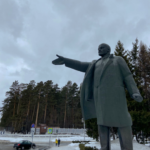
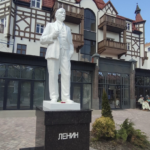
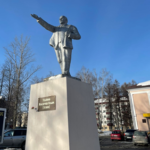
29.5-ft-tall Lenin statue in Siberian Seversk; Lenin’s Statue in a Town near Kazan; Lenin in Zelenogradsk, Kaliningrad Region (photos by authors, 2022).
From the “Great Patriotic War” to the “Great Ideological War”
The Great Patriotic War of 1941-1945, also called “the Sacred War,” was a detrimental identity-building experience for Soviet citizens.[3] About 27 million Soviets died during the war. Millions (Ukrainians, Belarusians, Russians, Moldovans, and others) defended the USSR while marching to the slogan of За Родину, за Сталина!/For Motherland, for Stalin!, using the concepts of motherland and Stalin almost interchangeably. The Soviet Union strategically utilized this rhetoric to trigger patriotism and glorify its leader at the time, Joseph Stalin.
Another statistic is even more terrifying and sobering: approximately 60 million people died in the GULAG, under the Stalinist regime, while Soviet children were chanting in the streets another popular slogan: Спасибо Товарищу Сталину за наше счастливое детство!/Thank you, Comrade Stalin, for our happy childhood! The infamous slogan of Solovki prison camp—also known as the “Mother of GULAG”—read Железной рукой загоним человечество к счастью /We will drive humanity into happiness with an iron hand. Stalin, the man made of steel, delivered: brutal “ethnic laboratories,” massive forced displacement, unreported genocides, and enforced groupthinking contributed to the crafting of Homo Sovieticus. Eventually, Russia and the USSR were understood, used, and interpreted interchangeably at home and abroad. Stalin managed to craft the Soviet superpower through Russian hegemony in all domains of the public sphere. Moreover, the Soviet-Soldier-Liberator figure became the new national hero, who had freed Europe from Nazism. Every year, Russia honors the Great Patriotic War on May 9 by organizing immense parades all over the country.[4]
During the Cold War period, the Nazi enemy and the USA/capitalistic West gradually fused. Patriotic Soviet slogans warned: If today you wear Adidas, tomorrow you will sell out your Motherland!; and Today, s/he is smoking Kents, and tomorrow, s/he is an enemy/foreign agent![5] The feeling of animosity between the superpowers was reciprocal. Former US President Ronald Reagan famously branded the USSR as “The Evil Empire,” and the USSR always distrusted the West; this sentiment never fully faded, even after the fall of the Soviet Union in 1991. Since 2000, President Putin has succeeded in revitalizing and weaponizing the Soviet legacy, because the narrative of national and cultural superiority in Russia always works.
The banality of Putin
Vladimir Putin came to power in 2000, after the fall of the USSR, which had been followed by the economically devastating and excruciatingly embarrassing 1990s. He took power as “one of us,” a man from the folk and a man of the people (человек из народа), a backslapper (рубаха-парень), and a hyper-masculine, athletic, fearless military man, jack-of-all-trades patriot. Putin makes Russian children’s wishes come true. He drives a common Russian people’s car— a Lada Kalina[6]—to support the Russian automotive industry. Putin rides horses, fishes, and swims with dolphins. He is known for participating in yearly “hotlines”[7] where he responds to people’s queries. Russian popular slogans read Без Путина нет России/Without Putin, there is no Russia,[8] and Сильный президент-Сильная Россия/Strong President-Strong Russia.[9] Most importantly, Putin gives the Russians what they have been missing since the fall of the Soviet superpower: the feeling of national pride and readiness to restore their former might. Under Putin, the USSR’s state anthem became the Russian national anthem: both use the same music, and the lyrics have been only slightly modified by the poet Sergey Mikhalkov who had written the words to the USSR anthem. For example, the “USSR’ was replaced with “Russia,” an “age-old union of fraternal peoples,” and “Lenin” was replaced with “God.”
In his annual address to the Federal Assembly[10] in 2005, Putin called the dissolution of the USSR the “main geopolitical disaster of the century.” Putin’s ambition to re-create his beloved USSR has regularly manifested itself in different forms, including through the 2008 invasion of Georgia, the 2014 annexation of Crimea, and the 2022 war in Ukraine.[11] Shockingly, according to the Russian worldview, the metaphorical bear simply protects—and liberates—its stray cubs. Furthermore, what Ukraine and the world has considered to constitute the annexation of Crimea, Russia considers reunification.[12] Putin has emphasized that Crimea is a historical part of Russia that deserves to be “under Russian protection.”[13] Popular slogans describe Putin as “the savior of Crimea and Sevastopol” and thank him “for Crimea and Sevastopol.” Similarly, Putin has emphasized that the Donbass has always been Russian, even when it was created in 1922-1924.[14] In February 2022, President Putin accused Ukraine of committing an anti-Russian genocide[15] in that region. Shortly after, he proceeded with a special military operation to “demilitarize” and “de-nazify” Ukraine.[16] State-controlled Russian media and social media have enthusiastically supported these claims.
Weaponizing Russian rhetoric against the wicked West
Western criticism of Russia has often been counterproductive, has unified the Russians, and has promoted Russian patriotism.[17] Putin has embodied patriotism based on anti-Westerness, Russia’s moral superiority, and the immensity of the Russian world (Русский Мир). Putin himself has said that he is immune to the West’s criticisms: “It has no effect on me.”[18] He is often heard condemning the West,[19] especially the US, for what happens in the world. Recently, Putin asked how the US would react if Russia stationed its missiles near the Mexico-US border and reminded the US about international territorial disputes. Overall, Putin’s Russia still considers what became commonly known as the “collective West” an untrustworthy and morally inferior enemy. The so-call загнивающий Запад/the rotting West. In line with that, Russia has considered Europe as weak, wimpy, and immoral, and nicknamed it Gayrope (Гейропа). That particular framing originated in 2014, right after Austrian drag queen Conchita Wurst won the famous Eurovision song contest. Homophobic trends exploded on Russian social media. Alexander Pushkin’s poetry was even rewritten and recycled to comment on the event:
Родила царица в ночь
Не то сына, не то дочь;
Не мышонка, не лягушку,
А неведому зверюшку
То ли баба, толь мужик,
То ли немец, толь таджик
Сиськи, попа, борода…/
Europe, sire, last night
Was delivered of a fright–
Neither son nor daughter, nor
Have we seen like this before.
Neither woman nor man,
Neither German nor Tadjik,
It has breasts, a butt, and a beard…
Russia seized this opportunity to position the outcome of the Eurovision in opposition to the high morality of Russian values. Predictably, as Western brands[20] leave Russia, Russians are reminded that associating with the West is wrong. The Russian president keeps reminding Russian citizens that Russia will not agree with Western politics.[21] The Russian media have reported that anti-Russian sanctions damage the global economy while weaponizing Ukraine and that Western countries have forgotten about their own safety.[22] Andrey Koshkin, a political expert based in Moscow, has argued that the sanctions “brought the West to its knees.”[23] Russian economist Vladimir Skalkin has claimed that for the US, Ukraine’s war is nothing more than a chance to make money.[24] For the Russians, the 40 billion dollars of American financial support delivered to Ukraine is a money laundering scheme.[25] In reaction to sanctions and the “cancel culture,” Putin declared that “the West tore off its masks of decency.”[26] Russia taking pride in its anti-Western stoicism is reminiscent of the Cold War. According to the Ministry of Economic Development of the Russian Federation, the national currency[27] has recently reached peak values and many Russians are said to mock the West. Indeed, Putin called the West “The empire of lies,”[28] and provided his version of the truth about the martyrdom of the Great Russia and its holy mission to end anti-Russian genocide and Nazism.
Z–world: the omnipresence and omnipower of Russian persuaZion
“Z” has been displayed to signal support for the war all around Russia. This symbol of the esteemed Great Patriotic War—the ribbon of Saint George—has been twisted to resemble the infamous “Z.” In Putin’s Russia, Soviet nostalgia[29] and state-controlled propaganda[30] have emerged together. “Nazi Ukraine”[31] has replaced “Nazi Germany,” and Putin’s preemptive action has constituted a correction of Stalin’s mistake not to attack preemptively. For Putin, saving the world from Nazism[32] now means saving Ukrainians and Russians in Ukraine from the cruel regime of Kyiv,[33] a regime that has been supported by the profit-thirsty West. “Z” has become a symbol of a new patriotic Russia, which is portrayed as a noble savior. Even the Church in Russia has supported the war, while Pope Francis has expressed that he is certain Putin will not stop.[34] Strategically and systemically brainwashed, young people have been supportive of the president and the military aggression. Indeed, thousands of schoolchildren regularly become “all-Russian Pioneers” and provide support[35] for Russia’s invasion of Ukraine. Morevoer, school lessons focus on Russian heroism, duty, dignity, and patriotism.[36]
Today, for many Russians, especially those born and raised in the Soviet Union, letting Ukraine go would mean letting go of a part of Russian history and bidding farewell to the idea of a united Soviet superpower. Peace cannot be achieved in Ukraine as long as the Russian past—including its ultimate Soviet product, President Vladimir Putin—has not defined the Russian present and while the Chief of Proletariat—Vladimir Lenin—still defines the cityscape of every city or town in Russia, large or small. Above all, the current Russian engagement in Ukraine cannot end in peace because Ukraine executed the “fallism” of Lenin statues (aka “Leninofall”) to fully disengage itself from its Soviet past and turn to the West for help. Metaphorically speaking, the war will continue as long as Russia practices Leninophilia and attempts to recreate the Soviet Union and as long as Ukraine continues with Leninofall and attempts to move away from its Soviet past and build democracy. The West has declared economic and rhetorical war on Russia and has been Russia’s ultimate Other for many decades. Therefore, the war continues on all fronts, including the battlefield of communication.
Julia Khrebtan-Hörhager is Associate Professor at Colorado State University. She specializes in critical cultural communication and international studies. She is Director/Leader of Education Abroad programs in Italy and Program Director of ACT International Human Rights Film Festival.
Evgeniya Pyatovskaya is a PhD Candidate at South Florida University. She specializes in intercultural dialogue, organizational communication and translational feminism. She is a former Fulbright Scholar from Colorado State University and an Atlas Corps Fellow in New York.
[1] Emrys Westacott, “Nietzsche’s ‘The Use and Abuse of History,’” ThoughtCo (ThoughtCo, February 2018) https://www.thoughtco.com/nietzsches-the-use-and-abuse-of-history-2670323.
[2] Jack Maden, “Hannah Arendt on Standing up to the Banality of Evil,” Philosophy Break (Philosophy Break, May 2020), https://philosophybreak.com/articles/hannah-arendt-on-standing-up-to-the-banality-of-evil/.
[3] Julia Khrebtan-Hörhager, “Collages of Memory: Remembering the Second World War Differently as the Epistemology of Crafting Cultural Conflicts between Russia and Ukraine,” Journal of Intercultural Communication Research 45, no. 4 (2016): pp. 282-303, https://doi.org/10.1080/17475759.2016.1184705.
[4] Aleksandra Dorokhina, “Парады в Честь Дня Победы Пройдут в 28 Российских Городах,” [Victory Day Parades to take place in 28 Russian cities] Izvestiya, May 5, 2022, https://iz.ru/1330310/2022-05-05/parady-v-chest-dnia-pobedy-proidut-v-28-rossiiskikh-gorodakh.
[5] Julia Khrebtan-Hoerhager, “Shielding Democracy from Putin’s S/Words,” National Communication Association, March 8, 2022, https://www.natcom.org/spectra/shielding-democracy-putins-swords.
[6] “Путин Поговорил с Девочкой, Чью Мечту Помог Исполнить,” [Putin talked to the girl whose dream he realized]. RIA Novosti, December 15, 2021, https://ria.ru/20211215/putin-1763837599.html.
[7] “Кому Помог и Что Обещал Народу Владимир Путин,” [Who Putin helped and what he promised to the people] Парламентская Газета (April 14, 2016), https://www.pnp.ru/politics/2016/04/14/komu-pomog-i-chto-obeshhal-narodu-vladimir-putin.html.
[8] “Нет Путина – Нет России: Президент в Оценках Чиновников и Бизнесменов,” [No Putin-No Russia: Bureaucrats’ and Businessmen’s Opinions about the President] РБК, October 23, 2014, https://www.rbc.ru/photoreport/23/10/2014/54491408cbb20f72ecea58db.
[9] “Стали Известны Темы Агитационных Роликов Путина Для ТВ,” [Putin’s presidential campaign videos are now public] ruffnews.ru, 2018, https://www.ruffnews.ru/Stali-izvestny-temy-agitatsionnyh-rolikov-Putina-dlya-TV_38166.
[10] “Annual Address to the Federal Assembly of the Russian Federation,” President of Russia, April 25, 2005, http://en.kremlin.ru/events/president/transcripts/22931.
[11] Julia Khrebtan-Hoerhager, “Shielding Democracy from Putin’s S/Words,” National Communication Association, March 8, 2022, https://www.natcom.org/spectra/shielding-democracy-putins-swords.
[12] “Anniversary of Crimean Reunification Gives Entire Russia Reason to Celebrate, Says Putin,” TASS, March 2021, https://tass.com/society/1267479?utm_source=google.com&utm_medium=organic&utm_campaign=google.com&utm_referrer=google.com.
[13] “Vladimir Putin’s Annual News Conference,” President of Russia, December 23, 2021, http://en.kremlin.ru/events/president/news/67438.
[14] “Vladimir Putin’s Annual News Conference,” President of Russia, December 23, 2021, http://en.kremlin.ru/events/president/news/67438.
[15] Alexander Hinton, “Putin’s Claims That Ukraine Is Committing Genocide Are Baseless, but Not Unprecedented,” The Conversation, September 13, 2022, https://theconversation.com/putins-claims-that-ukraine-is-committing-genocide-are-baseless-but-not-unprecedented-177511.
[16] Andrew Osborn and Polina Nikolskaya, “Russia’s Putin Authorises ‘Special Military Operation’ against Ukraine,” Reuters (Thomson Reuters, February 24, 2022), https://www.reuters.com/world/europe/russias-putin-authorises-military-operations-donbass-domestic-media-2022-02-24/.
[17] Julia Khrebtan-Hörhager and Evgeniya Pyatovskaya, “The West Thinks That Russians, Suffering from Sanctions, Will End up Abandoning Putin – but History Indicates They Won’t,” The Conversation, September 13, 2022, https://theconversation.com/the-west-thinks-that-russians-suffering-from-sanctions-will-end-up-abandoning-putin-but-history-indicates-they-wont-179075.
[18] “Meeting of the Valdai Discussion Club,” President of Russia, October 22, 2020, http://en.kremlin.ru/events/president/news/64261.
[19] “Vladimir Putin’s Annual News Conference,” President of Russia, December 23, 2021, http://en.kremlin.ru/events/president/transcripts/press_conferences/67438.
[20] Julia Khrebtan-Hörhager and Evgeniya Pyatovskaya, “The West Thinks That Russians, Suffering from Sanctions, Will End up Abandoning Putin – but History Indicates They Won’t,” The Conversation, September 13, 2022, https://theconversation.com/the-west-thinks-that-russians-suffering-from-sanctions-will-end-up-abandoning-putin-but-history-indicates-they-wont-179075.
[21] Ekaterina Blinova, “US Military Expert: Russia to Score Major Victories in Donbass, Must Adapt to New NATO Game,” Sputnik International (Sputnik International feedback@sputniknews.com+74956456601MIA ”Rosiya Segodnya” 25260, May 22, 2022), https://sputniknews.com/20220522/us-military-expert-russia-to-score-major-victories-in-donbass-must-adapt-to-new-nato-game-1095703665.html.
[22] Napisat Shamkhalova, “Взаимные Упреки: Кто Заплатит За Антироссийские Санкции,” [Mutual Reprimands: Who will pay for anti-Russia sanctions], VestiRU, 2022, https://www.vesti.ru/.
[23] Konstantin Nazarenko, “Эксперт Заявил о Негативном Влиянии Антироссийских Санкций На Евросоюз,” [An expert stated that anti-Russia sanctions negatively affect the EU], Известия, May 4, 2022, https://iz.ru/1329729/2022-05-04/ekspert-zaiavil-o-negativnom-vliianii-antirossiiskikh-sanktcii-na-evrosoiuz.
[24] Valentina Peskova, “Эксперт Указал На Выгоду США От Закона Об Оказании Помощи Украине,” [Expert pointed out how the U.S. benefits from Ukraine security assistance program], Izvestiya (Партийный переулок, д. 1, к. 57, с. 3 115093 Москва, Россия info@iz.ru, May 21, 2022), https://iz.ru/1337936/2022-05-21/ekspert-ukazal-na-vygodu-ssha-ot-zakona-ob-ukazanii-pomoshchi-ukraine?yrwinfo=1653322374762838-17327943847145811404-vla1-2676-vla-l7-balancer-8080-BAL-5037.
[25] Ekaterina Blinova, “US Military Expert: Russia to Score Major Victories in Donbass, Must Adapt to New NATO Game,” Sputnik International (Sputnik International feedback@sputniknews.com+74956456601MIA „Rosiya Segodnya” 25260, May 22, 2022), https://sputniknews.com/20220522/us-military-expert-russia-to-score-major-victories-in-donbass-must-adapt-to-new-nato-game-1095703665.html.
[26] “Meeting on Socioeconomic Support for Regions,” President of Russia, March 16, 2022, http://en.kremlin.ru/events/president/news/67996.
[27] “Укрепление Рубля Достигло Пиковых Значений,” [Ruble is as strong as ever], DailyMoscow, May 23, 2022, https://dailymoscow.ru/news/ukreplenie-rublya-dostiglo-pikovyh-znacheniy?utm_source=smi2.
[28] Gennadiy Svidrigailov, “Путин Охарактеризовал Запад Как ‘Империю Лжи’ – Газета.Ru: Новости,” Газета.Ru, February 28, 2022, https://www.gazeta.ru/politics/news/2022/02/28/17358355.shtml.
[29] “Russia z Campaign Whips up Patriotic Support for Ukraine ‘Operation’,” South China Morning Post, March 11, 2022, https://www.scmp.com/news/world/europe/article/3170078/ukraine-war-russian-z-campaign-whips-support-putins-special.
[30] Atle Staalesen, “Российскую Молодежь Захлестнула Волна Военной Пропаганды,” [Russian youth engages in pro-war propaganda], The Independent Barents Observer, March 2022, https://thebarentsobserver.com/ru/bezopasnost/2022/03/rossiyskuyu-molodezh-zahlestnula-volna-voennoy-propagandy.
[31] Anton Lavrov, “Обыкновенный Нацизм: Как Айдаровцы Содержали Пленных Под Старобельском,” [Usual Nacism: How Aidarov Battalion held hostages in Starobselsk], Izvestia, March 10, 2022, https://iz.ru/1303387/anton-lavrov/obyknovennyi-natcizm-kak-aidarovtcy-soderzhali-plennykh-pod-starobelskom.
[32] “Поклонская Сообщила о Помощи Беженцам Из Украины в Переезде в Россию,” [Poklonskaya announced help to Ukrainian refugees relocating in Russia], РБК, May 23, 2022, https://www.rbc.ru/rbcfreenews/628b55a79a7947c63cadd356.
[33] Paul Kerley and Robert Greenall, “Ukraine War: Why Has ‘z’ Become a Russian pro-War Symbol?,” BBC News (BBC, March 7, 2022), https://www.bbc.com/news/world-europe-60644832.
[34] “NATO May Have Provoked Russia over Ukraine – Pope,” RT International, 2022, https://www.rt.com/news/554907-pope-nato-provoke-russia/.
[35] “Russian Communists Stage Red Square Induction for Young Pioneers,” The Moscow Times (The Moscow Times, May 2022), https://www.themoscowtimes.com/2022/05/23/russian-communists-stage-red-square-induction-for-young-pioneers-a77773.
[36] “Putin Hails Crimea Annexation and War with Lessons on Heroism,” BBC News (BBC, March 18, 2022), https://www.bbc.com/news/world-europe-60793319.
Moscow, May 9 2020, Military Parade. Photograph by authors.
Published on December 12, 2022


